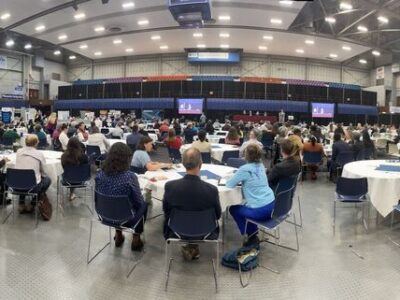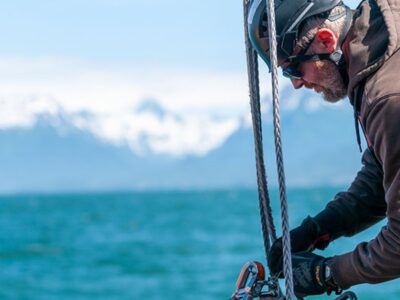The United States Department of Energy (DOE) has awarded $22 million to help improve the planning, siting, and permitting processes for large-scale renewable power facilities. In a March 25 press release, the DOE announced that six state-based projects will receive $10 million through the Renewable Energy Siting through Technical Engagement and Planning (R-STEP) program.
That money will be used to develop and expand statewide initiatives that provide expertise, training, and technical resources to local governments and communities. The aim is to help stakeholders plan for and evaluate large renewable energy and storage projects.
In addition, the DOE said it will open a second round of the R-STEP program with up to $12 million in funding from the Inflation Reduction Act. Large-scale wind, solar, and energy storage projects are expected to play a “pivotal role in decarbonizing the grid” to achieve the White House’s goals of a 100% clean electricity sector by 2035 and a net-zero emissions economy by 2050.

Photo Courtesy NC Clean Energy Technology Center
“Solar and wind energy and battery storage are on the rise throughout America,” Jennifer M. Granholm, U.S. secretary of energy, said in a statement. “This year, we expect these to make up a record-breaking 94% of our nation’s new electric-generating capabilities. Often, the biggest barrier to deploying that clean generation is siting and permitting.”
According to the DOE, R-STEP’s primary mission is to help communities “better plan for and meaningfully engage in the development of large-scale renewable energy and energy storage projects.”
One goal is to accelerate the deployment of renewable power by aiding in establishing more “predictable, community-oriented, and science-based” siting processes for developers and permitting authorities.

Photo Courtesy NC Clean Energy Technology Center
The DOE describes renewable energy siting as a “complex series of decision-making processes and actions that determine the location and design of new wind, solar, storage, and other renewable energy facilities.” State and local governments might not always have the resources, time, or expertise to proactively plan for future deployment of these facilities or to address siting barriers.
“A lot of these permitting processes around the country are asking the same questions, and so if you add it up and you add up all of the delays that are happening in all of the different proceedings, it’s a lot of delay,” Steve Kalland, executive director of the NC State University Energy Collaborative, told WSOC-TV in an interview earlier this year. “If we can answer some of these questions one time and make the information available to everybody, hopefully, that will squeeze a lot of time out of the overall picture of permitting.”

Photo Courtesy NC State University: Energy Collaborative
North and South Carolina were among seven states awarded money through R-STEP.
In the Carolinas, the NC Clean Energy Technology Center will work with “local stakeholders, developers, utilities, landowners, and governments to create an online assistance and education hub,” WSOC-TV reported.
Here are the other states to get money through the program:
- Indiana ($1.9 million): A collaborative led by Purdue University Extension will serve as a technical resource and community engagement hub to assist Indiana communities with renewable energy planning, evaluation, and decision-making.
- Iowa ($1.7 million): Led by Iowa State University Extension and Outreach, this collaborative will develop and disseminate educational resources for city- and county-level officials who are planning renewable energy and storage facilities.
- Michigan ($2 million): A collaborative led by the Michigan Department of Environment, Great Lakes, and Energy will establish a hub for resources and experts in renewable energy siting.
- Mississippi ($2 million): A collaborative led by the Mississippi Development Authority’s Energy & Natural Resources Division will develop a large-scale solar power development playbook and training course and provide technical assistance working together with the Mississippi planning and development districts.
- Wisconsin ($1 million): Led by the University of Wisconsin-Madison Division of Extension, this collaboration will engage stakeholders and expand education and facilitation services to rural communities in the areas of renewable energy and battery storage.





